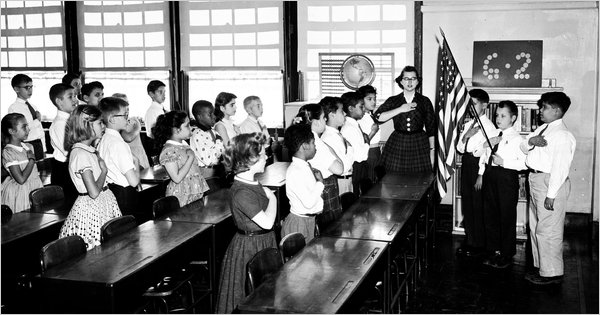Fight over God in Pledge of Allegiance a Waste of Effort
Much ado is made about the Pledge of Allegiance, arguing whether the term “Under God” should or should not be recited.
Religious folks insist on God being included. Nonreligious folks think it should be eliminated. Regardless of religious orientation, we are all Americans, taxpayers and loyalists, and many are veterans who fought for this country. And, according to the Declaration of Independence, we are all created equal, religion notwithstand- ing.
In September, the Massachusetts Supreme Court heard arguments in which plaintiffs argued that the term “Under God” in the pledge violates separation of church and state, and therefore the First Amendment to the Constitution. That case is still under review, though general opinions indicate that the pledge will probably remain as worded. Should the state court strike the two-word phrase, we can expect a cascade of similar lawsuits in other states.
As of now, 38 states have adopted laws that give children a choice to say the pledge. Schools in five states do not recite the pledge.
The real problem is that the argument digresses from the purpose of the pledge. When I place my hand upon my heart, I don’t consider it a prayer or a religious recitation. It is a promise to be loyal to our nation, symbolized by the stars and stripes. The term “Under God” was not officially inserted until President Dwight Eisenhower signed the bill into law during Flag Day 1954. In Cold War days, the national spirit was to separate a “Godless” Soviet Union from a “God-loving” America.
With all the hoopla, we lose sight that this is a simple pledge, not a religious promise. It seems ludicrous that two words would cause so much distress to either side of the argument, words which any American can choose to utter, or choose not to. Omitting “Under God” doesn’t make any less of an allegiance being pledged.
Nonbelievers should consider more important issues to pursue and drop the tenacious defamation of a widely accepted recitation. When atheists arrive at that phrase, they can remain mute, then continue on. The pledge is still a pledge.
Like who’s listening?
Parents who object to the schoolroom reciting of “Under God” for their children are perfectly free to teach their kids accordingly. Children and young adults who abstain from uttering those two words are breaking no rules. This is America. It is a choice.
We have enormous social, political, economic and national security problems in our country. Escalating a two-word phrase in to a passionate argument should not even make newsprint. The First Amendment applies to all Americans whether they believe in God nor not. Therefore, no one — including schoolchildren — should be forced to include words in the pledge that acknowledge God. It’s a matter for free speech.
The pledge is just that: a pledge to America, to love honor and respect, and to acknowledge we all are all one, indivisible, as Americans, with liberty and justice for all.
Can’t we all just get along?


